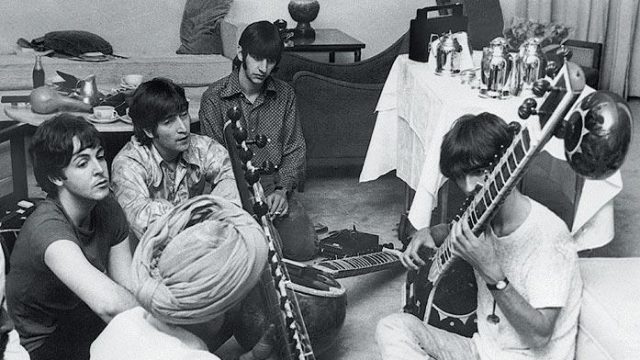1966 was a pivotal year for The Beatles. They recorded one of their greatest albums, Revolver, the peerless double-A side single ‘Strawberry Fields Forever/Penny Lane’, and started work on Sgt. Pepper’s Lonely Hearts Club Band. They also stopped playing live after their world tour ended in the US in August. The brilliance of their early albums gave way to breathtaking sonic adventures as the band widened its palette, deviated sharply from pop-norms, and in effect created art-pop.
At the centre of this sonic overhaul was the Indian drone. In this, The Beatles weren’t the first. Both John Coltrane and The Byrds had already experimented with the elasticity of Indian classical music in their work, inspired by one man — Ravi Shankar. Omnivorous in their musical tastes, The Beatles were quick to follow its possibilities. While John Lennon tried approximating the effect with tape loops and backward guitars in tracks like ‘Tomorrow Never Knows’, George Harrison went straight to the sitar. Not content with having played a cheap, out-of-tune instrument on 1965’s ‘Norwegian Wood’, George pounced on the first chance he got to buy a proper sitar.
On their way back to England at the end of a traumatic tour of the east, during which they were threatened by right-wing groups in Japan and roughed up by Imelda Marcos’s goons in the Philippines, John, Paul, George and Ringo had a day in Delhi. Getting out of their rooms in The Oberoi, the four went on a sightseeing tour. Stopping at Connaught Place, where people tried unsuccessfully to sell them ivories and antique chess sets, the band checked out Rikhi Ram’s old musical instruments shop. Harrison had his heart set on a sitar, so the shop arranged to have someone bring some of the instruments to the hotel.
In this photo, a Rikhi Ram employee tries out the instruments along with a studious Harrison, while the other Beatles look on. Although Harrison had already composed a haunting raga-pop tune in ‘Love You To’, he took a break later that year, and came to India again, to study under Ravi Shankar, and cement a friendship that would last all his life.




